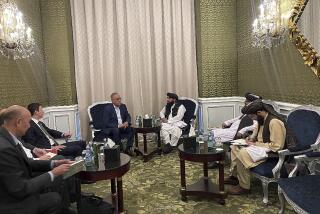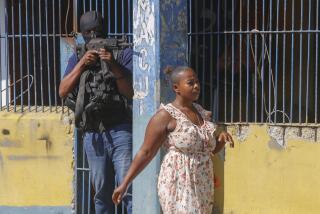Afghan Talks Shift Focus to Short Term
- Share via
KOENIGSWINTER, Germany — Eager to get international aid into their shattered country, Afghan leaders Saturday put aside the contentious task of choosing a provisional parliament to concentrate on an interim Cabinet to govern a post-Taliban Afghanistan for the next four months.
Exactly who would serve in the roughly 20-member “interim authority” was still being hashed out early today, but delegates from four groups representing a broad array of political and ethnic interests said they were committed to putting a leadership together before going home.
The scaling back of their objectives at the U.N.-sponsored talks here means there will be no transitional head of state for the first few months. Afghanistan’s former king will have a role, however, because the delegates plan to ask him to convene and preside over a council of tribal elders in the spring to determine the country’s long-term future.
The compromise came after an overnight standoff between the dominant Northern Alliance delegation here and Burhanuddin Rabbani, its political leader, who has remained in the Afghan capital, Kabul. Although limited, the agreement appeared to herald the first prospects for peace and civilian government for Afghanistan in nearly 23 years.
U.N. organizers and foreign diplomats cautioned that the hard work is still ahead in deciding who will occupy positions of power in what is designed as a transitional government of experts and technocrats.
While there remained doubts about the respect any agreement reached here would be accorded by Afghanistan’s myriad warlords and regional chieftains, the delegates reiterated their commitment to ending their country’s cycle of violence and chaos.
Internal rivalries within the Northern Alliance had threatened to split the dominant delegation only a day earlier. Rabbani, who had sent his faction of primarily minority Tajiks, Uzbeks and Hazaras to this Bonn suburb to negotiate, had refused Friday to endorse a list of candidates for the interim leadership bodies, insisting that Afghans themselves should vote on their representatives.
Alliance delegation leader Younis Qanooni had joined the heads of the three other groups--representing the deposed king, Mohammad Zaher Shah, and exiles based in Iran and Pakistan--in vowing to bring order to Afghanistan by installing a broad-based Cabinet and parliament to govern until elections can be held.
After the alliance’s leadership council met in Kabul, its foreign minister, Abdullah, said the discussions here and in the Afghan capital “suggest we should be able to conclude a deal very soon.”
Rabbani had been insisting that any final deal on interim governing bodies or the deployment of foreign peacekeepers be reached in Kabul, not abroad. He also said no more than 200 foreign troops should be allowed to augment Afghan gunmen in enhancing security.
Exiles expecting to take up a role in the interim authority have said they will return to Kabul only if a neutral, multinational security force is in place to guarantee their safety. The Afghan capital is in the hands of alliance fighters who swept in behind the Taliban when U.S. airstrikes helped chase the fundamentalists from power.
Abdullah’s comments Saturday suggested that Rabbani, whose political power has steadily waned in recent years, had been overruled to meet the demands of Western governments, led by the United States, that want an early deal on the specifics of a new government in Kabul.
While Rabbani, a former Afghan president, appeared to be trying to cling to power despite his record of savagery and anarchy during his 1992-96 administration, Abdullah and the alliance delegates here represent a new generation of Afghans tired of conflict and willing to compromise for peace.
A spokesman for Zaher Shah said the former king will choose the head of the interim Cabinet, a figure who will serve as de facto prime minister. There will be no head of state until the council of elders, known as a loya jirga, can meet in the spring, said Daoud Yaqub, head of the Afghanistan America Foundation in Washington and a lobbyist for the former king’s camp.
Zaher Shah was deposed in a palace coup in 1973 and hasn’t been back to his homeland since. He has, however, maintained contacts with Afghans across a broad spectrum of political, ethnic and religious interests, Daoud said.
Diplomatic observers from 18 countries have reminded the Afghan leaders throughout their talks here that foreign aid worth billions of dollars is dependent on their establishing a government the outside world can deal with. They have also have urged the delegates to decide on measures to enhance security, but the issue of foreign peacekeepers will apparently be taken up in Kabul.
By putting off the creation of a parliamentary body, the delegates were able to sidestep battles about how to apportion representation to reflect the various ethnic, religious, political and cultural entities within the country.
One ethnic Pushtun delegate for the alliance, Haji Abdul Qadir, walked out of the talks late Thursday in protest of what he saw as an unrepresentative group deciding serious issues of nation-building for Afghanistan. The Shiite Hazaras have also complained that they were not adequately represented here.
*
Times staff writer Paul Watson in Kabul contributed to this report.
More to Read
Sign up for Essential California
The most important California stories and recommendations in your inbox every morning.
You may occasionally receive promotional content from the Los Angeles Times.











